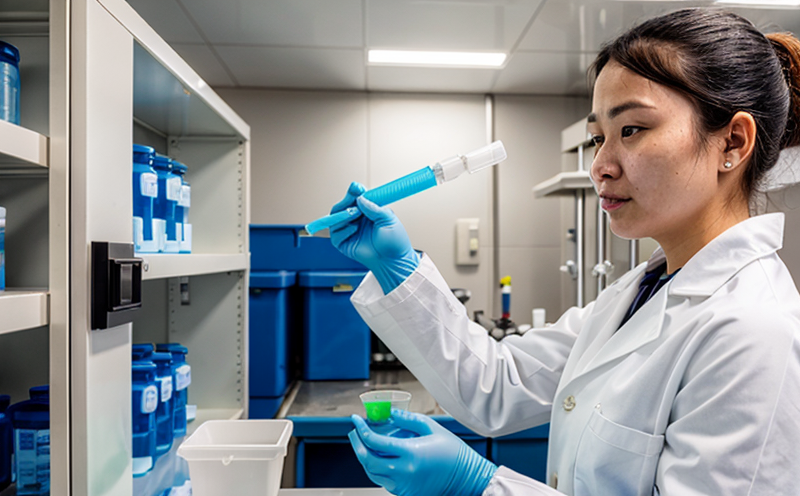USP Non Sterile Product Microbial Testing
The USP Non Sterile Product Microbial Testing service is a critical component in ensuring the quality and safety of pharmaceutical products. This testing ensures that non-sterile products meet stringent microbial limits as prescribed by the United States Pharmacopeia (USP). The primary objective is to identify any potential contamination with microorganisms that could compromise product integrity or patient health.
Pharmaceuticals are subject to rigorous quality control measures, and microbial testing plays a pivotal role in this process. This service covers various aspects of non-sterile products including APIs (Active Pharmaceutical Ingredients), excipients, formulations, and final drug products. The test is particularly important for ensuring compliance with the latest USP standards.
The testing protocol involves several steps which include:
- Sample Collection: Samples are collected from various stages of production to ensure that all potential sources of contamination are covered.
- Preparation: The samples undergo necessary preparation for analysis, including dilution and plating as required by the USP guidelines.
- Culture and Identification: Cultures are grown on appropriate media to identify specific microorganisms. Identification is crucial as certain microorganisms can be harmful or cause product degradation.
- Quantification: Quantitative methods are used to determine the extent of microbial contamination, ensuring that the product adheres to the specified limits.
The results of this testing provide critical information for quality assurance and compliance. They help in identifying potential issues early on, allowing for corrective actions to be taken before products reach the market. This not only enhances patient safety but also ensures regulatory compliance with USP monographs.
For pharmaceutical companies, this service is essential as it supports the development of high-quality products that meet stringent standards set by regulatory bodies like the FDA and EMA. It contributes significantly to maintaining consumer trust and ensuring that products are safe for use in medical applications.
| Applied Standards | Description |
|---|---|
| USP NF 31 | The latest edition of the United States Pharmacopeia, which includes specific microbial limits and testing methods. |
| ISO 11737-2:2006 | An international standard for the microbiological examination of pharmaceutical products. |
| EN ISO 9370-1:2008 | A European standard that specifies methods for the enumeration of microorganisms in pharmaceuticals. |
The application of these standards ensures consistency and reliability in microbial testing, providing a robust framework for quality control.
Applied Standards
| Standard | Description |
|---|---|
| USP NF 31 | The latest edition of the United States Pharmacopeia, which includes specific microbial limits and testing methods. |
| ISO 11737-2:2006 | An international standard for the microbiological examination of pharmaceutical products. |
| EN ISO 9370-1:2008 | A European standard that specifies methods for the enumeration of microorganisms in pharmaceuticals. |
The application of these standards ensures consistency and reliability in microbial testing, providing a robust framework for quality control.
Industry Applications
This service finds extensive applications across the pharmaceutical industry. It is particularly useful during:
- Product Development: Ensuring that new formulations do not contain unacceptable levels of microorganisms.
- Manufacturing Processes: Monitoring production lines for any signs of contamination, ensuring compliance with regulatory requirements.
- Batch Release Testing: Verifying the quality and safety of each batch before release to market.
- R&D Activities: Supporting research and development by providing detailed data on microbial presence in experimental batches or formulations.
The results from this testing are invaluable for ensuring that products meet stringent regulatory standards, thus protecting public health and maintaining consumer trust.
Why Choose This Test
- Regulatory Compliance: Ensures adherence to USP monographs and other relevant international standards.
- Quality Assurance: Provides critical data on microbial contamination, supporting ongoing quality improvements.
- Risk Mitigation: Identifies potential risks early in the production process, allowing for timely corrective actions.
- Patient Safety: Guarantees that products are free from harmful microorganisms, ensuring safe use by patients.
- Reputation Protection: Maintains a positive brand image and public trust through consistent quality control measures.
- Supply Chain Integrity: Ensures that all suppliers meet the same high standards of microbial testing.
- Data Integrity: Provides comprehensive, reliable data for regulatory submissions and internal reports.
- Innovation Support: Supports R&D activities by providing detailed insights into product formulations.
Choosing this service ensures that your pharmaceutical products meet the highest standards of quality and safety, thereby protecting both your reputation and public health.





